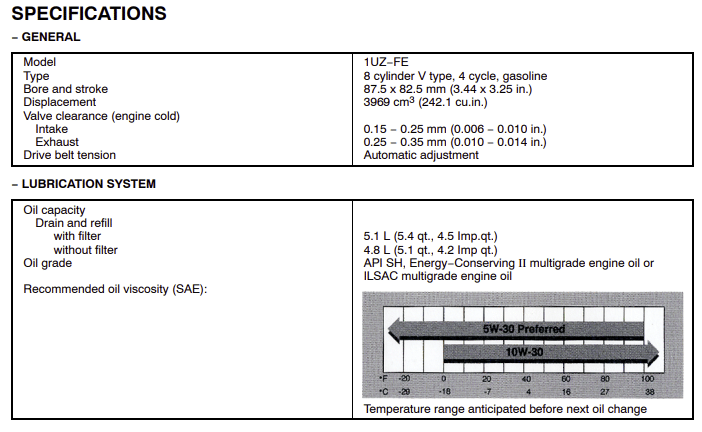Hey there, fellow car enthusiasts! Today, we’re going to dive into the world of the classic 1995 Lexus LS400, a luxury sedan that still turns heads and purrs like a kitten. I will give you a quick rundown of this gem of a car and emphasize the importance of using the right oil type to keep that engine running as smoothly as silk. So, buckle up, and let’s get started!
Now, if you’ve got yourself a 1995 Lexus LS400, you know you’re sitting in the lap of luxury. This car was way ahead of its time when it first hit the market. With a powerful 4.0L V8 engine delivering 260 horsepower, rear-wheel drive, and all the bells and whistles that make a car truly luxurious, the LS400 was designed to impress. It’s got that classic style and a ride quality that’s as smooth as a baby’s bottom, making it a real treat to drive.
But let me tell you something, my friends—having a top-notch luxury sedan like the LS400 doesn’t mean you can skimp on maintenance. Oh no, you’ve got to take care of that baby, and that starts with using the right oil type. After all, your engine oil is the lifeblood of your car—it keeps everything lubricated, cool, and running smoothly.
Choosing the wrong oil type for your Lexus LS400 is like putting regular gas in a jet engine—you might get off the ground, but you’re going to run into some serious issues down the road. So, listen up and learn about the best oil type for your classy ride because, trust me, your engine will thank you for it!
What Kind of Oil Does a 95 Lexus LS400 Take?
Now, if you’re the lucky owner of a 1995 Lexus LS400, you’ve got to listen to what the experts are saying. In this case, the experts are the good folks at Lexus who built this magnificent machine. They know what they’re talking about, so let’s pay attention to their recommendations.
First things first: oil capacity. When you’re draining and refilling your oil with a new filter, you’ll need 5.1 L (5.4 qt., 4.5 Imp.qt.) of engine oil. As for the viscosity, Lexus recommends using SAE 5W-30. It’s the preferred choice for your LS400’s engine, providing the perfect balance of protection and performance.
Lexus also recommends using engine oil with an API SH rating, Energy-Conserving II multigrade designation, or ILSAC multigrade engine oil. These ratings ensure that the oil you’re using meets specific standards for performance and engine protection, so don’t skimp out on quality. You want the best for your LS400, and that means following these recommendations.

Now, let’s talk about climate, because it plays a role in choosing the right oil type for your 1995 Lexus LS400. In extremely low temperatures, the engine might have trouble starting if you’re using SAE 10W-30 engine oil. That’s why Lexus recommends sticking with SAE 5W-30, which performs better in cold weather conditions. So, no matter where you live or what Mother Nature throws your way, that 5W-30 oil will keep your LS400 running like a champ.
I can’t stress this enough, folks: following the manufacturer’s recommendations for your Lexus LS400 is crucial. They’ve done the research, and they know what works best for your engine. Choosing the right oil type will not only keep your engine in tip-top shape, but it’ll also help prolong its life and maintain that smooth, luxurious ride you love so much. So, stick to the plan, and your LS400 will thank you for it!
Understanding Engine Oil
Alright, let’s get down to the nitty-gritty of engine oil and why it’s so important for your car. Without engine oil, your vehicle would be as useful as a giant paperweight. Here’s why:
First and foremost, engine oil acts as a lubricant, creating a protective barrier between all those moving metal parts in your engine. Without it, you’d have metal grinding against metal, and that’s a recipe for disaster. Besides reducing friction and wear, engine oil also helps cool down your engine by dissipating heat from those hot surfaces.
But wait, there’s more! Engine oil also plays a vital role in engine protection and maintenance. It helps keep your engine clean by suspending dirt and other particles, preventing them from causing damage or clogging up your engine. Plus, it helps protect against corrosion and rust, which can lead to costly repairs down the road.
Different Types of Engine Oil
Now that we’ve established the importance of engine oil, let’s talk about the different types you might come across. Each has its own set of characteristics and benefits, so let’s break it down:
- Conventional Oil
Conventional oil is your basic, no-frills engine oil. It’s derived from crude oil and works well for older vehicles or those with lower mileage. However, it doesn’t have the same level of performance and protection as some of the more advanced oils on the market.
- Synthetic Oil
Synthetic oil is the cream of the crop when it comes to engine oils. It’s made from a blend of synthetic base stocks and performance-enhancing additives, offering superior protection, lubrication, and performance over conventional oil. It’s particularly well-suited for high-performance and luxury vehicles like the Lexus LS400.
- Synthetic Blend Oil
As the name suggests, synthetic blend oil is a mix of conventional and synthetic oils. It’s a step up from conventional oil, offering improved performance and protection at a slightly lower price point than full synthetic oil. This might be a good option for those looking for a middle ground between conventional and synthetic.
- High-Mileage Oil
Finally, we have high-mileage oil, which is specially formulated for vehicles with over 75,000 miles on the odometer. It contains additives that help reduce oil consumption, minimizes leaks, and restore engine performance in older engines. If your LS400 has seen a lot of road time, high-mileage oil might be worth considering.
Engine Oil Consumption
Now, let’s talk about something that might surprise you: all engines consume some oil during normal operation. That’s right! It’s completely normal, so don’t go panicking if you notice a bit of oil consumption. Let me explain why this happens and what you can do about it.

There are several factors that can affect how much oil your engine consumes, including:
- Lubrication of pistons, piston rings, and cylinders: A thin film of oil is left on the cylinder wall when a piston moves downwards. High negative pressure generated during deceleration can suck some of this oil into the combustion chamber, where it’s burned off by high-temperature combustion gases.
- Lubrication of intake valve stems: Some oil used to lubricate the intake valves is sucked into the combustion chamber along with the intake air, where it’s burned with the fuel. Additionally, high-temperature exhaust gases can burn the oil used to lubricate the exhaust valve stems.
- Viscosity and quality of the oil: The type of oil you use and its quality can affect consumption. High-speed driving and frequent acceleration and deceleration can also increase oil consumption.
- Engine age and condition: New engines typically consume more oil, as their pistons, piston rings, and cylinder walls have not yet become conditioned. As the engine ages, consumption may also increase due to wear and tear.
Importance of Checking Oil Level Regularly
I cannot stress this enough: it’s essential to check your oil level regularly. Lexus recommends checking the oil level every time you refuel your vehicle. Failure to do so could lead to serious engine trouble due to insufficient oil.
Here’s the deal: maintaining the optimum oil level is crucial for the proper function of your engine. Not only will it help keep your engine running smoothly, but it’ll also prevent unnecessary wear and tear on your vehicle’s components.
So, make it a habit to check your oil level when you fill up your tank. It’s a small task that can go a long way in protecting your 1995 Lexus LS400 and ensuring it runs like a dream for years to come.
Best Oil Brands for the 1995 Lexus LS400
When it comes to choosing the best oil brand for your 1995 Lexus LS400, you want to go for quality and performance. There are several reputable oil brands out there that have earned the trust of car enthusiasts like you and me. Some top choices for the LS400 include:
- Mobil 1
- Castrol
- Valvoline
- Pennzoil
- Royal Purple
Now, let’s take a look at the features and benefits of these top oil brands, so you can decide which one is right for your Lexus LS400:
- Mobil 1: Known for its advanced synthetic formulas, Mobil 1 offers excellent engine protection, performance, and fuel economy. Their 5W-30 synthetic oil is specifically designed to keep your engine clean and well-lubricated under a variety of driving conditions.
- Castrol: Castrol offers a range of synthetic, synthetic blend, and high-mileage oils that deliver outstanding performance and protection. Their Castrol EDGE 5W-30 is a popular choice for luxury vehicles like the LS400, providing superior engine cleanliness and wear protection.
- Valvoline: Valvoline’s lineup includes synthetic, synthetic blend, and high-mileage oils that offer impressive protection and performance. Their SynPower 5W-30 synthetic oil boasts excellent high-temperature protection, ensuring your LS400’s engine stays cool even under stress.
- Pennzoil: Pennzoil offers a variety of synthetic and synthetic blend oils that are designed to keep your engine clean and well-protected. Their Pennzoil Platinum 5W-30 is a high-quality synthetic oil that provides excellent wear protection and engine cleanliness.
- Royal Purple: Known for its premium synthetic oils, Royal Purple offers high-performance engine protection and improved fuel efficiency. Their Royal Purple 5W-30 synthetic oil is formulated to provide superior wear protection, improved fuel economy, and smoother engine operation.
Before you settle on an oil brand for your 1995 Lexus LS400, it’s always a good idea to read consumer reviews and testimonials to get a feel for what other drivers have experienced. Websites like Amazon, automotive forums, and even your local mechanic can offer valuable insights into the performance and reliability of each oil brand.
Keep in mind that while some drivers may swear by one brand, others might have a different preference. Ultimately, the best oil brand for your LS400 is the one that meets the manufacturer’s recommendations and offers the performance and protection you’re looking for.
So, do your research, compare the options, and choose the oil brand that will keep your 1995 Lexus LS400 running like a dream for many more miles to come.
How to Check and Change Oil in the 1995 Lexus LS400
To ensure your 1995 Lexus LS400 stays in top condition, it’s crucial to check the oil level regularly. Here’s how you can do it:
- Park your car on a level surface and turn off the engine. Allow the engine to cool for a few minutes, as hot oil can be dangerous and may not give an accurate reading.
- Open the hood and locate the engine oil dipstick, which usually has a yellow or orange handle.
- Pull out the dipstick, wipe it clean with a lint-free cloth or paper towel, and reinsert it fully into the tube.
- Remove the dipstick again and check the oil level. It should be between the “Low” (L) and “Full” (F) marks. If it’s below the “Low” mark, you’ll need to add more oil.
- Add oil through the oil filler cap on top of the engine if necessary. Use a funnel to avoid spills, and add a small amount of oil at a time. Recheck the level with the dipstick after each addition to ensure you don’t overfill the engine.
- Once the oil level is within the proper range, reinsert the dipstick and close the hood.
When to Change the Oil
For the 1995 Lexus LS400, it’s generally recommended to change the oil and oil filter every 3,000 miles or 3 months for conventional oil, and every 5,000 to 7,500 miles or 6 months for synthetic oil. However, your specific driving conditions and habits may affect these intervals. Always consult your owner’s manual for the most accurate information.
How to Change the Oil and Oil Filter
Changing the oil and oil filter in your 1995 Lexus LS400 is a straightforward process. Follow these steps:
- Warm up the engine by running it for a few minutes. This will help the oil drain more easily.
- Park your car on a level surface and engage the parking brake. You may need to use ramps or jack stands to lift the front of the vehicle for better access to the oil pan and filter.
- Place a drain pan under the oil pan and remove the drain plug using a socket wrench. Allow the oil to drain completely.
- Once the oil has drained, replace the drain plug and tighten it securely. Be careful not to overtighten, as this may strip the threads.
- Move the drain pan under the oil filter. Using an oil filter wrench, loosen and remove the old oil filter. Make sure the old filter gasket comes off with the filter.
- Lubricate the new oil filter’s gasket with a thin layer of fresh oil. Screw the new filter onto the engine by hand until it’s snug, then tighten it an additional 3/4 turn with the oil filter wrench.
- Locate the oil filler cap on top of the engine, remove it, and use a funnel to add the recommended amount and type of oil for your LS400. Check the oil level with the dipstick to ensure it’s within the proper range.
- Replace the oil filler cap and start the engine. Check for any leaks around the oil pan drain plug and the oil filter. If you notice any leaks, turn off the engine and tighten the plug or filter as needed.
- Dispose of the used oil and oil filter responsibly. Most auto parts stores or service stations will accept used oil and filters for recycling.
And that’s it! With regular oil checks and changes, you’ll keep your 1995 Lexus LS400 running smoothly and efficiently for years to come.
Safe Disposal of Used Engine Oil
Used engine oil poses several health and environmental hazards. It contains potentially harmful contaminants, which may cause skin disorders, inflammation, or even skin cancer upon prolonged or repeated contact. Furthermore, improper disposal of used oil can contaminate water sources, harm wildlife, and pollute the environment.
To minimize the risks associated with used engine oil, follow these proper handling and disposal methods:
- Wear protective gloves: Always wear gloves when handling used engine oil to minimize skin contact. If oil comes into contact with your skin, wash thoroughly with soap and water.
- The store used oil in a sealed container: When draining used oil from your engine, collect it in a suitable container with a tight-fitting lid to prevent spills and leaks. Do not use containers that previously held chemicals or food, as they may cause contamination.
- Do not mix with other substances: Avoid mixing used engine oil with other automotive fluids, such as antifreeze or brake fluid, as this can make recycling more difficult and may create hazardous waste.
- Locate a recycling center or disposal facility: Many auto parts stores, service stations, and recycling centers accept used oil and oil filters for recycling. Check with your local government or search online for a nearby facility that accepts used engine oil.
- Transport used oil carefully: When taking used engine oil to a recycling center or disposal facility, ensure that it is securely contained to prevent spills during transportation. Place the container in a sturdy box or tray to catch any potential leaks.
Conclusion
Using the right oil type for your 1995 Lexus LS400 is essential to ensure optimal performance, engine protection, and fuel efficiency. By adhering to the manufacturer’s recommendations for oil viscosity, API, and ILSAC ratings, you can keep your engine running smoothly and minimize wear and tear. Additionally, taking into account factors such as climate and driving conditions will help you make the best oil choice for your specific needs.
To keep your 1995 Lexus LS400’s engine in top condition and extend its lifespan, follow these maintenance tips:
- Regular oil changes: Change your engine oil and oil filter at the recommended intervals, according to the type of oil you’re using and your driving habits. This will help keep your engine clean and well-lubricated.
- Check oil levels frequently: Make a habit of checking your engine oil level every time you refuel, as this will ensure that your engine is always adequately lubricated and help you detect any potential issues early on.
- Use quality oil and filters: Invest in high-quality engine oil and oil filters from reputable brands, as these products will provide better protection and performance for your engine.
- Keep up with routine maintenance: Regularly inspect your vehicle for any signs of wear or damage, and follow the manufacturer’s recommended maintenance schedule for services such as fluid changes, belt replacements, and tune-ups.
- Monitor engine performance: Pay attention to any changes in your engine’s performance, such as unusual noises, reduced power, or decreased fuel efficiency. Address any issues promptly to prevent further damage or costly repairs.



